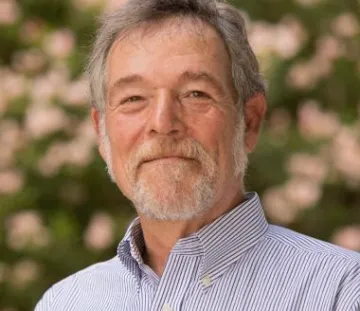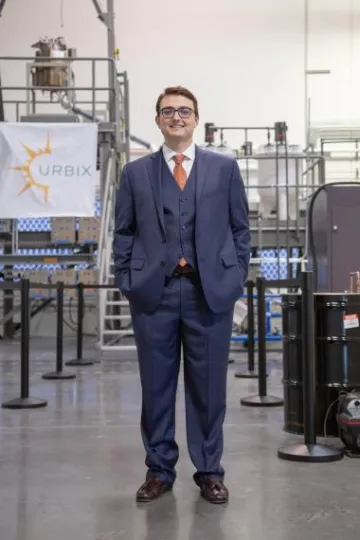October 2020

Mark Baker, commercialization partner with Tech Launch Arizona (TLA).
When Mark Baker started Modular Mining Systems in 1979, he and his partners, all of whom came from the University of Arizona, knew practically nothing about bringing innovation to market. After a successful sale of the company and a career in mining technology consulting and entrepreneurship, Baker returned to the UArizona to help other innovators start business ventures.
In 2016, Baker became a commercialization partner with Tech Launch Arizona (TLA), the University of Arizona’s commercialization arm that spins off businesses based on research at the university. He volunteers to help TLA understand the marketability of mining-related inventions and helps inventors and entrepreneurs bring their products to market.
“When we started Modular, none of us had any business experience,” recalled Baker, a board member of the Lowell Institute for Mineral Resources. “It took us a long time to get to that point. “We had to learn business through the school of hard knocks.”
The company, which provided software to efficiently direct mining trucks, was a global firm when it was sold in 1999. Baker then created CheckMark Consulting Inc. to help mining companies and suppliers adopt emerging technologies.
He was involved in the early development and commercialization of autonomous haulage in mining. He has used his startup knowledge to provide strategic advice to several companies, including Blue Planet Strategies, Phoenix Drill Control and Flow Partners. “My goal is to help people,” said Baker. “I like to see entrepreneurs succeed. It’s very gratifying to assist an entity and see it become successful.”
Tech Launch Arizona facilitates tech transfer
TLA works with university inventors to move ideas and inventions through the steps toward commercialization, including patenting, licensing, business development and networking opportunities with investors and mentors. “We move technology from idea stages all the way through to launching a company,” said Doug Hockstad, TLA’s assistant vice president.
“Mark has lots of expertise in the mining space,” Hockstad said. Along with his work with the Lowell Institute, Baker sits on the Industry Leadership Board of the UArizona Mining and Geological Engineering Department and the Dean’s Advisory Board of the UArizona Engineering Department. That makes him valuable in vetting inventions for commercial potential.

UArizona alumnus Nico Cuevas.
And Baker predicts a future when TLA will see more inventions coming out of the realm of mining research. The industry has become more open to working with academia to create products that could be applied across the board. And the industry often is in the forefront of innovation.
“Autonomous vehicles were developed and commercialized in mining long before the auto industry began to invest,” he said. Mining covers many fields: the environment, housing, health and safety, engineering, logistics, construction, sales, marketing, business, law. “Most people don’t realize the mining industry touches every discipline,” he said.
Mining inventions become commercial successes
Baker’s mentorship sometimes extends into the board room, including as a director for serious-games developer Desert Saber LLC and a senior adviser for Guia LLC, a health-monitoring firm.
Mary Poulton, the Lowell Institute’s co-director, leads Desert Saber and co-leads Guia. She credits TLA for honing the firms’ business and technology development. Desert Saber was expected to ramp up sales of its employee training software before COVID-19 disrupted operations, she said. Guia continues to refine software that monitors workers’ health. “Without TLA, I would say we wouldn’t have attempted to commercialize,” Poulton said. “It would be stuff locked in a research lab and people wouldn’t have the benefit of it.”
UArizona alumnus Nico Cuevas expressed similar sentiments regarding Urbix Inc., a graphite processing company that he founded with fellow students. About a year ago, the company opened its purification plant that processes graphite using environmentally friendly agents and procedures. It has service agreements with companies in five countries and eastern Africa, as well as throughout the United States and Europe. It is the only domestic company of its kind, Cuevas said.
Among other services, TLA helped put together a team of advisers to guide them through the marketing process. “They’ve been crucial to our progress and advancement of our company,” said Cuevas, who is Urbix’s executive chairman. “We had never done this before and it’s such a niche market. We had no clue of anything.”
These mining-related spinoffs from UArizona research were commercialized through TLA efforts:
- Acrete produces fly-ash-based material that replaces concrete.
- Auxilium Technologies Group provides sustainable mining technologies for leaching processes, effluent treatment and tailings repurposing.
- Caltrode manufactures a reference electrode to measure corrosion in nickel-based alloys that host heat transfer fluids at high temperatures.
- Clean Earth Technologies created a polymer-based product that controls dust.
- Desert Saber develops customizable industrial synthetic learning environments for training workers.
- Guia provides software that monitors the health of workers in real time and on site.
- Urbix Inc. processes graphite, used in batteries, using a low-cost, environmentally friendly method.

